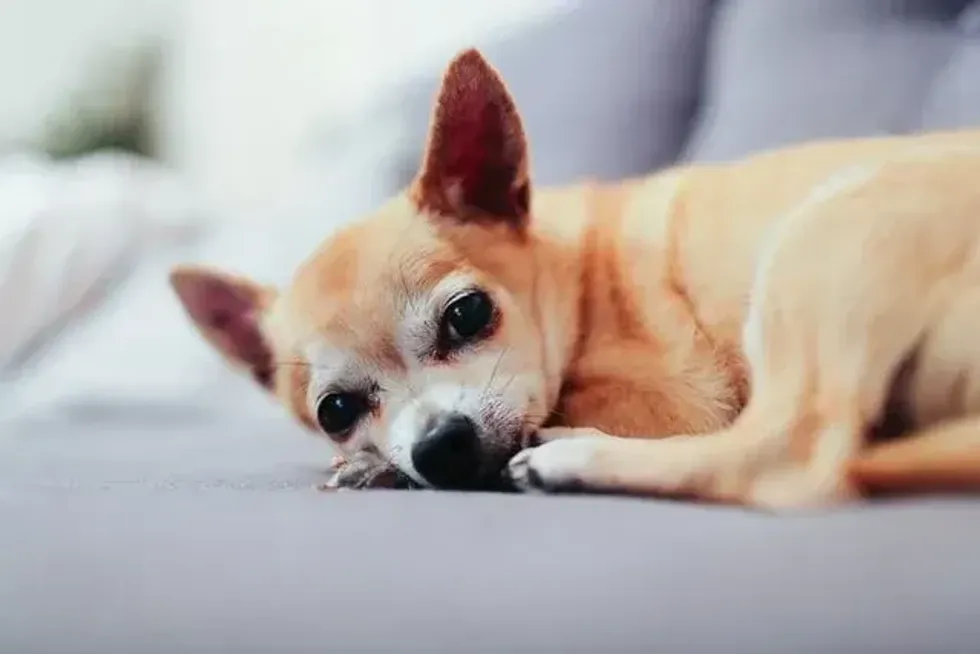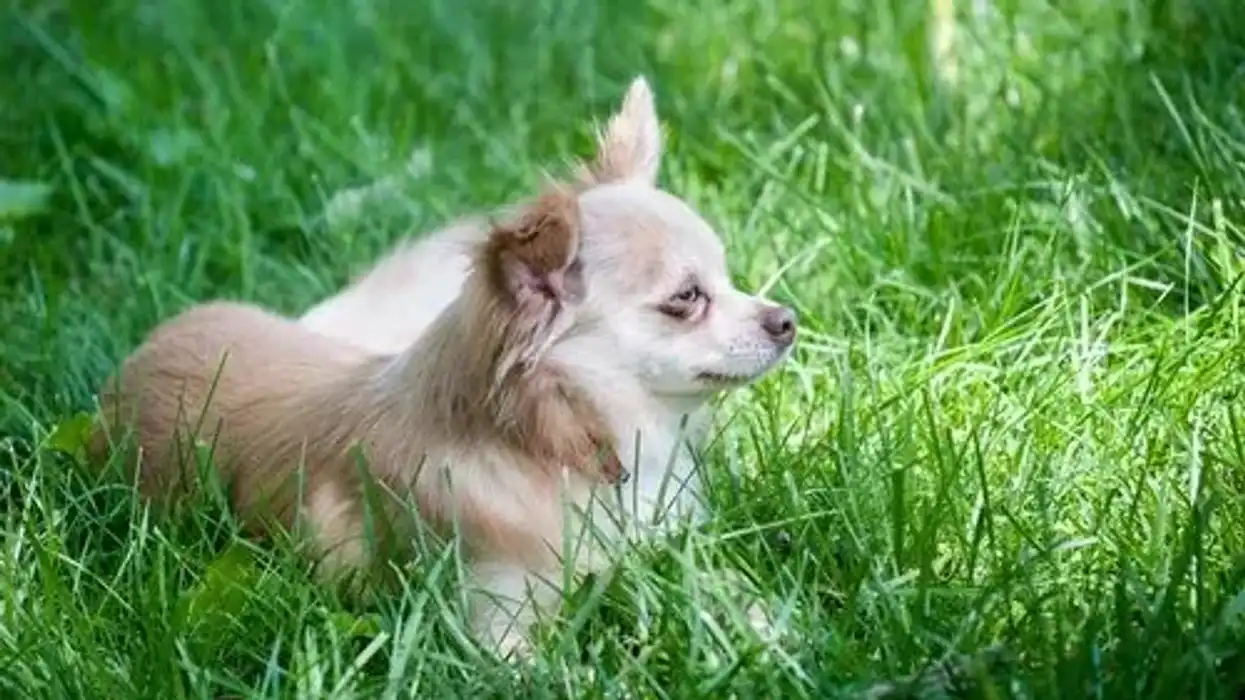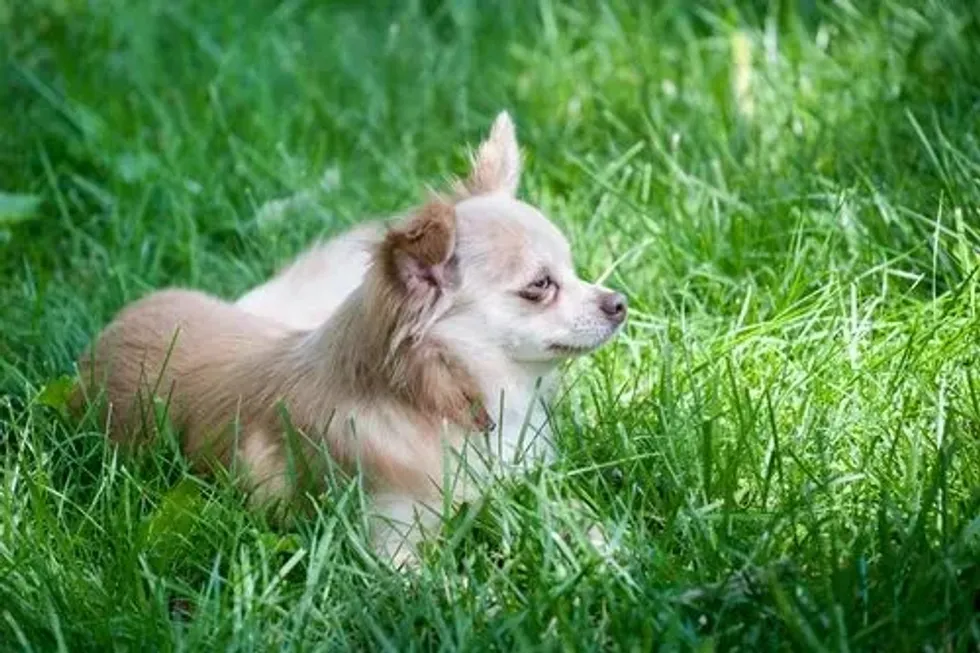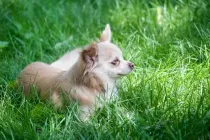Fun Chion Facts For Kids

Content
- What type of animal is a Chion?
- What class of animal does a Chion belong to?
- How many Chions are there in the world?
- Where does a Chion live?
- What is a Chion's habitat?
- Who do Chions live with?
- How long does a Chion live?
- How do they reproduce?
- What is their conservation status?
- What do Chions look like?
- How cute are they?
- How do they communicate?
- How big is a Chion?
- How fast can a Chion run?
- How much does a Chion weigh?
- What are their male and female names of the species?
- What would you call a baby Chion?
- What do they eat?
- Are they slobbery?
- Would they make a good pet?
- Did you know...
- Characteristics and health issues
- Getting your own Chion
A Chion is a mixed breed dog, which is half Chihuahua and half Papillion. It is a small-sized dog that can come in a variety of color combinations, but mostly a combination of cream, brown, or white.
This loveable small breed dog is also known as a Papihuahua, Chi a Pap, and Pap Chi! Chions are intelligent dogs, with plenty of character.
They are known for being a little stubborn to train initially but after plenty of positive reinforcement, they become very obedient dogs. In recent years we have seen the trend for small hybrid dogs such as Chions emerge.
Chions don't require a large amount of exercise, excessive grooming, or a vast expanse of space, and as such, they are a very practical pet dog for many people. If you are interested in reading more fact files about dog breeds check out our shepherd collie mix and corgipoo articles too.
Chion Interesting Facts
What type of animal is a Chion?
Over the years, we have seen a rise in popularity for designer hybrid dogs. That’s mixing two well-known breeds to create a new breed.
A Chion dog is a short dog, which is a Chihuahua Papillon mix. To be officially recognized as a Chion they have to be born from a first-generation Chihuahua and Papillon. This direct lineage is an essential requirement of the American Canine Hybrid Club (ACHC), instead of being born from two Chion parents.
What class of animal does a Chion belong to?
As with all dog breeds, the Chion breed belongs to the category of mammals.
How many Chions are there in the world?
We are uncertain how many Chions are in the world, hopefully, as the new breed becomes more recognized, more data will become available in time. Interestingly we know that both the Chihuahua and Papillon go far back in history.
Chihuahua dogs are believed to originate from the 10th to the 12th century in Mexico. The Papillon breed of small dogs can be traced in examples of historical art from the 1500s.
Where does a Chion live?
A Chion lives with its owners in a house.
What is a Chion's habitat?
A Chion is a hybrid dog, intentionally cross-bred to be pets for us humans. As such they are not found in the wild and live in homes as domestic pets.
Since they are small dogs they are ideal for those living in flats and apartments, but be warned that they are vocal dogs! They are not designed for extreme temperatures like some snow or mountain dogs are. Dogs are adaptable, and Chions can live in a kennel, though more commonly they are kept as family pets within homes.
Who do Chions live with?
Chions are lively friendly lap dogs that love to live alongside us humans. They make a great companion and are truly loyal to their owners.
Their friendly temperament makes them a great pet, and as with all dogs, Chions are very social and dislike being left alone. Most dogs dislike cats, however, in time and with training, they can learn to live alongside other pets.
How long does a Chion live?
A Chion's life span is similar to all small dog breeds, which is approximately 10-15 years. This depends on their lifestyles, so maintaining a balanced diet and plenty of exercise is encouraged.
As with all small dog breeds, Chions have health issues such as patellar luxation, just one of the problems commonly associated with both the Chihuahua and the Papillon breeds. They are also prone to hypoglycemia, heart problems and tracheal collapse.
How do they reproduce?
A female Chion dog and male Chion dog reproduce their offspring through mating.
What is their conservation status?
A Chion is classified as Least Concern when it comes to its conservation status. In fact, they are bred specifically to meet demand.
Chion Fun Facts
What do Chions look like?
In brown, black, and various cream mixed tones, Chions with their little button noses and fluffy ears are among the cutest small dog breeds around. They make loyal pets with their friendly but feisty temperament. Their faces elude character and cuteness.
In fact, 'papillon' means 'butterfly' in French, and that’s just how their ears look, like a butterfly. The furry coat of a Chion can come in a variety of colors, and even solid colors.
Chions also have tufts of hair around their ears, feet, and tails called fringes. Their eyes are dark, and they have pointed ears. Male Chion dogs are often a little big bigger than female Chion dogs.
* Please note that this is an image of a Chihuahua, one of the parent breeds of the Chion. If you have an image of a Chion, please let us know at hello@kidadl.com.

How cute are they?
With so many color combinations of black, brown, and white coat, that little button nose, a shiny glossy coat, and butterfly ears, a Chion puppy is undoubtedly one of the cutest small dog breeds around. Not only are they super cute, but research has found they are one of the most intelligent small breeds around.
How do they communicate?
Like all small dogs, Chions communicate through barking, yelping, whimpering, and crying. These Chihuahua mix dogs have more of a high-pitched bark or yap when compared to larger dog breeds.
Chions are certainly very vocal dogs, and despite their size, they love to be heard! They will also gaze at you lovingly and surely greet you with a wagging tail once you walk through the door to show their happiness.
If you are lucky, they may give you plenty of licks. If they sense danger, Chions will growl, so approach with caution as, as with all dogs, they can bite.
How big is a Chion?
When it comes to the general size of a Chion, they are a small dog breed and are approximately 6-11 in (15-20 cm) tall. This is roughly half the size of a standard poodle dog. Small dog breeds are often categorized as 'toy' dogs.
How fast can a Chion run?
Despite their diminutive size Chions can run surprisingly fast! These little dogs are full of energy, just like both of the Chihuahua and Papillon breeds.
How much does a Chion weigh?
The average weight of a Chion is between 5-15 lb lb, (1.8-4.5 kg). Being a small dog it's important they follow a healthy balanced diet and get enough exercise, so they don't become obese.
What are their male and female names of the species?
There are no specific names for male or female Chion dogs. Often as with all dogs, male dogs are known as 'dogs', and females are called 'bitches'.
What would you call a baby Chion?
Just like all dogs, a baby Chion dog is called a puppy. They are also known as Chi a Pap puppies, and Pap Chi puppies.
What do they eat?
A Chion dog loves meat, especially poultry, though it's best to give a Chion a trusted brand of wet dog food. You can speak to your local pet store to find out which would be best for your Chion.
Maintaining a balanced diet with all the right minerals and vitamins is essential for a Chion, and supports their teeth, bone growth, and keeping a shiny coat.
When they are puppies they can be fed three to four times a day in small portions, as they grow they will require larger meals. They will be able to digest better once they grow.
Are they slobbery?
Chions can be slobbery just like their Chihuahua parent, but it depends on their overall oral health. Excessive saliva is often a sign of oral hygiene issues.
This could be tooth decay, ulcers, or other dental diseases. If your Chion is particularly slobbery, take them to a vet for a good check-up. It's also worth noting that it's commonplace for puppies to slobber when they go through teething as their gums can become sore and irritated.
Would they make a good pet?
Chions make the most wonderful loyal pets and are indeed a loving addition to any home. Both Chihuahuas and Papillons were bred to be small lapdogs and make a great companion.
As with many small dog breeds, they like to show that they are the boss, especially around bigger dogs! Their small size also lends itself well to homes that lack outdoor space, especially apartment living.
You’ll spot many Chions on the streets of cosmopolitan cities, often peeking that cute little button nose out of a handbag.
Owners often love to dress up Chions, so expect plenty of bows and a designer coat! As a Chion does not require the same amount of exercise larger dog breeds require, they make an ideal pet for older owners.
Grooming them is also relatively straightforward. Though take note, if you have small children you might want to reconsider getting a Chion as they can nip small hands.
Did you know...
Chions have fringes! Yes, that's right, and it's what makes them even more distinctive.
Across their body, they have tufts of fur longer than others. These Chion fringes are usually on their tail, neck, ears, and the back of their legs. Once their fur gets too long, take them to a groomer for a trim and to cut their claws.
Characteristics and health issues
This little Pap Chi breed is prone to some health issues associated with the small dog breeds. Notably, patellar luxation (this is a dislocation of the kneecap). It’s a common health issue within the Chihuahua breed, resulting in dislocation of bone.
They are also susceptible to eye conditions such as cataracts and glaucoma. The Papillon breed is also vulnerable to retinal atrophy, which is also found to be inherited within the Chion breed.
Be careful if you find adverts for teacup chi puppies. They are miniature versions of this small breed dog as they are commonly associated with many complex health issues.
Full of energy, their temperament is tenacious and a Chion puppy requires good training. They are smart dogs, and are full of energy and character.
As with all small dogs, a Chion dog must get sufficient exercise or they risk obesity-related health problems. It's also important not to play with a Chion too roughly, or allow another dog to play with them in such a way as, due to their tiny bones, they frequently experience sprains.
Getting your own Chion
Are you ready to share your life with a Chion? Once you have set your heart on a Chion puppy (and that’s really not so hard to do), make sure you find a responsible breeder.
A Chion should have a good stock gene pool and have proof of clearance of any anticipated genetic conditions, such as certificates. Be sure to ask about the dog's family's health and any associated health problems of any prospective puppy.
Don't forget to ask about patellar luxation and a few questions about their family temperament. Avoid pet shops or places where you cannot see the mother unless you are rehoming a rescued Chion.
Roughly you can expect the price for a Chion puppy to be around $250-750, depending on the standard of the breeder. Award-winning breeders and bloodlines are more costly. Chions are not the cheapest Chihuahua mix puppies, because Papillons are not a common breed. This makes them even more unique.
Should you choose the cute Chihuahua Papillon mix puppy, get them checked out with a good veterinarian. Make sure they have all their jabs, and medication to support their health.
This might include common routine dog practices such as deworming and de-fleaing. It's always good for a vet to have them on record to support their health needs throughout their lifetime.
When it comes to grooming, compared to many dogs Chions don't require a lot of work. Some Chions don’t have an undercoat which makes their fur easy to take care of, depending on if they were mixed with a long or short-haired Chihuahua.
If they have a long-haired coat, you’ll need a good quality steel comb for grooming their glossy coat at least weekly. Though don't worry, grooming won't take long as they are so small and excess hair comes off quickly.
At home, you can buy special dog shampoo for bath time. These dogs are hypoallergenic too!
Like all dogs, Chions require training with positive reinforcement to become well-behaved dogs. However, be warned the Chion breed is known for being a little stubborn once they commence training. You can find classes offering coaching with puppy training to get some professional support.
This might involve training about walking on a lead nicely. When it comes to exercise, be prepared to walk your Chion around 20-30 minutes daily.
That's enough time for a dainty little Chion. What's more, Chions love to swim! You can take them to a safe lake or fresh stream, though do be mindful of any strong undercurrents and don't take your eyes off them.
Here at Kidadl, we have carefully created lots of interesting family-friendly animal facts for everyone to discover! Learn more about some other mammals including the Cockapoo, or the Lowchen.
You can even occupy yourself at home by drawing one on our cute puppy coloring pages.
We Want Your Photos!
More for You
See All
Bachelor's degree specializing in Speech Therapy and Psychology, Postgraduate degree specializing in Dysphagia

Dayna ClarkeBachelor's degree specializing in Speech Therapy and Psychology, Postgraduate degree specializing in Dysphagia
A true "linguaphile," Dayna's upbringing in rural Devon exposed her to three languages spoken at home. After pursuing a Bachelor's degree in Speech-Language Pathology at the University of Reading, she embarked on a fulfilling career as a Speech and Language Therapist, specializing in early intervention for children with special educational needs. Additionally, she provides support to adults and teenagers dealing with dysfluency. She also has a postgraduate degree in Dysphagia from the Universitat Autònoma de Barcelona.
Bachelor of Business Management specializing in Financial Management

Sapna SinhaBachelor of Business Management specializing in Financial Management
Sapna has a Bachelor's degree in Business Administration from Poornima University, Rajasthan. She has writing experience from working for a news agency as a writer, interning at various companies, and writing and editing articles on education.
Disclaimer
1) Kidadl is independent and to make our service free to you the reader we are supported by advertising. We hope you love our recommendations for products and services! What we suggest is selected independently by the Kidadl team. If you purchase using the Buy Now button we may earn a small commission. This does not influence our choices. Prices are correct and items are available at the time the article was published but we cannot guarantee that on the time of reading. Please note that Kidadl is a participant in the Amazon Services LLC Associates Program, an affiliate advertising program designed to provide a means for sites to earn advertising fees by advertising and linking to Amazon. We also link to other websites, but are not responsible for their content.
2) At Kidadl, we strive to recommend the very best activities and events. We will always aim to give you accurate information at the date of publication - however, information does change, so it’s important you do your own research, double-check and make the decision that is right for your family. We recognise that not all activities and ideas are appropriate for all children and families or in all circumstances. Our recommended activities are based on age but these are a guide. We recommend that these ideas are used as inspiration, that ideas are undertaken with appropriate adult supervision, and that each adult uses their own discretion and knowledge of their children to consider the safety and suitability. Kidadl cannot accept liability for the execution of these ideas, and parental supervision is advised at all times, as safety is paramount. Anyone using the information provided by Kidadl does so at their own risk and we can not accept liability if things go wrong.
3) Because we are an educational resource, we have quotes and facts about a range of historical and modern figures. We do not endorse the actions of or rhetoric of all the people included in these collections, but we think they are important for growing minds to learn about under the guidance of parents or guardians.







